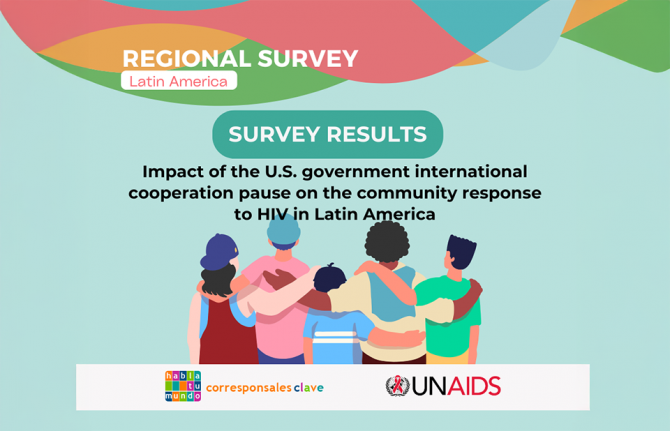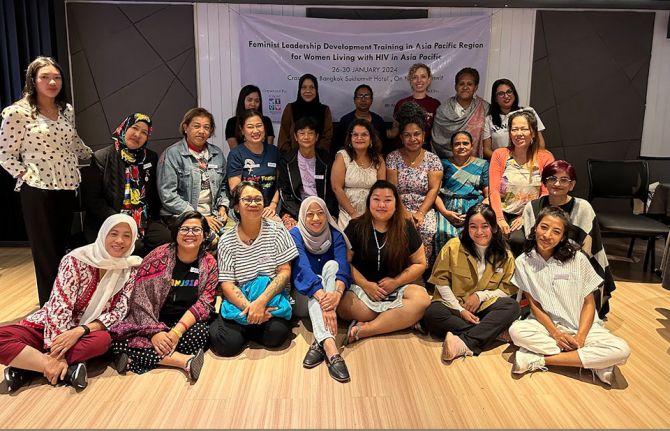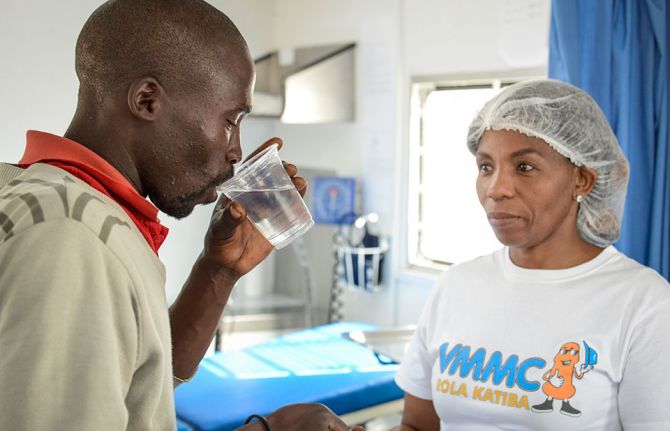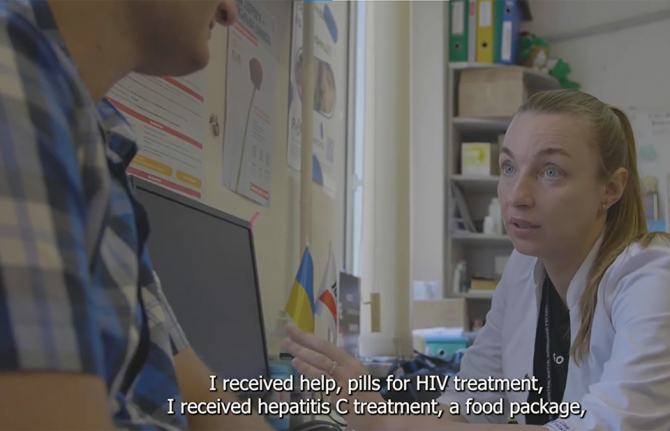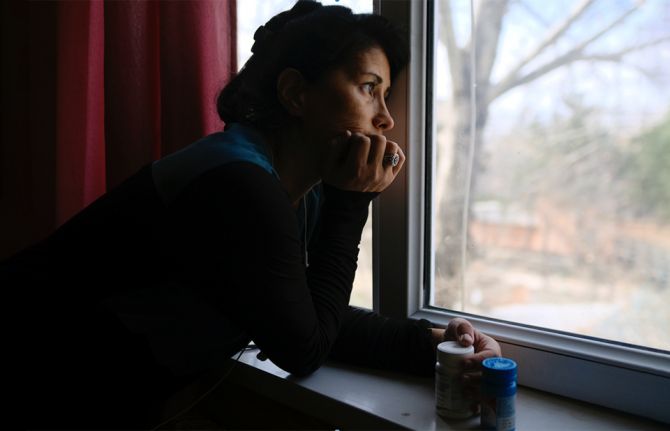
Feature Story
Experts meet on advancing access to HIV treatment
10 September 2013
10 September 2013 10 September 2013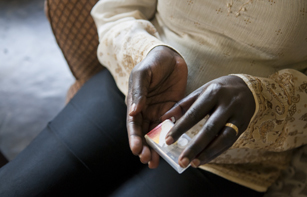
At the end of 2012, 9.7 million people worldwide had access to antiretroviral (ARV) therapy in low- and middle-income countries. Credit: UNAIDS
Experts call for increased access to life-saving HIV treatment. The call, made during a meeting held in New York on 4-5 September, follows the recommendations made last year by the independent Global Commission on HIV and the Law on improving access to HIV treatment.
The Global Commission’s landmark report recommended a new intellectual property framework for pharmaceuticals that would meet urgent public health needs while safeguarding the rights of inventors.
“While intellectual property protections are intended to provide an incentive for innovation, the evidence shows that excessive protection hinders access to affordable HIV treatment and other essential medicines,” Helen Clark, UN Development Programme (UNDP) Administrator told participants at the meeting convened by UNDP and UNAIDS. “Access to affordable, quality-assured pharmaceutical products remains an urgent priority for achieving the MDGs and improving health and development outcomes for poor and marginalized populations,” added Ms Clark.
At the end of 2012, 9.7 million people worldwide had access to antiretroviral (ARV) therapy in low- and middle-income countries, compared to just 300 000 people 10 years earlier. However, UNAIDS and the World Health Organisation estimate that another 16 million people are eligible to HIV treatment but lack access to it.
“We need solutions to increase access to life-saving HIV treatment and the recommendations of the Global Commission clearly outline how a people-centred approach can help ensure no one is left behind,” said Michel Sidibé, UNAIDS Executive Director.
While intellectual property protections are intended to provide an incentive for innovation, the evidence shows that excessive protection hinders access to affordable HIV treatment and other essential medicines.
Helen Clark, UN Development Programme Administrator
The World Trade Organization's (WTO) Agreement on Trade Related Aspects of Intellectual Property Rights, known as TRIPS, requires countries to abide to high intellectual property standards, including patent criteria that grant pharmaceutical companies long-term monopolies on medicines. When the TRIPS treaty was signed in 1994, it included terms that allow poor countries to produce or import cheaper medicines under specific circumstances. However, external pressure from wealthier countries has often prevented the application of such special clauses.
“The real crux of the Commission’s Recommendations was for a new intellectual property regime for pharmaceutical products – it is not enough to tweak the existing system,” said J.V.R. Prasada Rao, former Commissioner.
Talks at the meeting focused on strategies, tactics, and timelines to confront the growing need for HIV treatment, including how to make intellectual property laws work better for low-and middle-income countries. Next steps are under discussion.
“We should be encouraged that this meeting comes at a pivotal time when we are discussing the post-2015 development agenda, which presents us with significant opportunities,” said Michael Kirby, former Commissioner.
External links
External links
Related

Feature Story
Massive development gains in the South is improving the economic, social and health prospects for millions, says Human Development Report
14 March 2013
14 March 2013 14 March 2013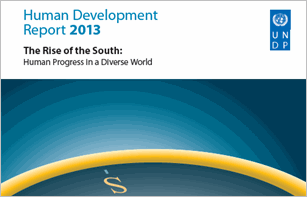
The countries of the South are shifting the global power balance with massive strides in economic growth, poverty reduction, education and health.
The world is changing rapidly with developing nations spearheading global economic growth, impressive poverty reduction and the rise of a healthier, better educated middle class, says the UN Development Programme’s (UNDP) Human Development Report 2013.
According to the publication, The Rise of the South: Human Progress in a Diverse World, this rise is “unprecedented in its speed and scale. Never in history have the living conditions and prospects of so many people changed so dramatically and so fast.”
The momentum of such achievements in poverty reduction, education, income and tackling health issues like HIV, is increasing. It can be seen as an overdue “global rebalancing” with new actors “shaping the development landscape” and gaining in political and economic influence.
There has been notably rapid progress in more than 40 countries of the South—traditionally referred to as developing nations—whose advancement has been markedly better than expected, the report notes. Coming from all continents and ranging widely in size, they include: Bangladesh, Brazil, Chile, China, Ghana, India, Mexico, Rwanda, Uganda and Vietnam. Uganda, for example, through a series of economic, health, education and social measures, has managed to halve extreme poverty before the Millennium Development Goal deadline of 2015. It fell from 56% in 1992-93 to 25% in 2009-10.
The rise of the South is unprecedented in its speed and scale. Never in history have the living conditions and prospects of so many people changed so dramatically and so fast.
Human development report 2013
The report was launched in Mexico City on March 14 by the UNDP’s Administrator Helen Clark and Mexican President Enrique Peña Nieto. As well as an extensive analysis of original research, it also contains an updated Human Development Index which measures the progress of nations in terms of health, education and income. In addition, the publication contains data on the critical gender aspect of development in its Gender Inequality Index which shows that despite serious inequities persisting, there has been progress in equality almost everywhere.
As with general development, the pace of success in the AIDS response is quickening in an unprecedented way. The 2012 UNAIDS global report showed that the rate of infection across 25 low- and middle-income countries has been cut by half.
The accelerated development of the South is critical to the success of the global AIDS response as the most heavily burdened countries are low-and middle income. UNAIDS maintains that getting to zero new infections, zero discrimination and zero AIDS-related deaths will need advances not only in the sphere of health and HIV but in terms of poverty reduction, education, gender equality and enhanced life opportunities

Feature Story
Special event at the Commission on the Status of Women seeks to accelerate zero-tolerance towards gender-based violence through the AIDS response
12 March 2013
12 March 2013 12 March 2013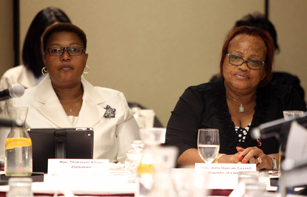
Co-chaires Hon Thokozani Khupe, Deputy Prime Minister of Zimbabwe (left) and Hon Julia Duncan-Cassell, Minister of Gender and Development of Liberia at the High Level Consultation Accelerating Zero-Tolerance to Gender based violence through the HIV response. New York City on March 9, 2013. Credit: UNAIDS/M. Taamallah
How much progress has the global AIDS response made in ensuring that women and girls live their lives free from violence? What are the next steps needed to strengthen the challenge to gender-based violence and its links to HIV? These critical questions dominated a high level consultation which took place in New York on 9 March during the 57th session of the Commission on the Status of Women (CSW).
Convened by UNAIDS and UN Women, and cosponsored by the Government of Ireland, the UN Development Programme and the UN Population Fund the consultation brought together key civil society activists, United Nations organizations and government representatives.
Co-chaired by Hon Thokozani Khupe, Deputy Prime Minister of Zimbabwe and Hon Julia Duncan-Cassell, Minister of Gender and Development of Liberia, the consultation took the priority theme of the CSW: elimination and prevention of all forms of violence against women and girls as a springboard to find ways to accelerate the attainment of Millennium Development Goals 3 (promoting gender equality) and 6 (halting HIV). Participants also discussed how to position HIV and gender-based violence on the post-2015 development agenda.
“The post-2015 agenda must be seen as finishing the last mile,” said Thokozani Khupe, Deputy Prime Minister of Zimbabwe. “We must see the things that are unfinished and try to tackle them differently,” she added.
The birth of a child is commonly the happiest day in a woman’s life. But in certain countries, the day a child is born from a mother with HIV, is the day when she dies or she starts to face discrimination
Jennifer Gatsi, Namibia Women’s Health Coalition
Gender based violence is a global epidemic, and it is the most brutal manifestation of gender inequality. According to UNAIDS, at least one in three women is beaten, coerced into sex or otherwise abused by an intimate partner in the course of her lifetime. In some countries, up to 45% of girls under the age of 15 report their first sexual experience as forced.
“Violence is not inevitable,” said Charlotte Watts from the London School of Hygiene and Tropical Medicine. “Even if figures are shocking, we should be inspired by them to work and address them.”
Tackling violence against women and girls is key if their vulnerability to the HIV is to be reduced. Women can be forced to have unwanted and unprotected sex and they can face violence if they reveal that they are living with HIV. Research in South Africa has shown that young women subjected to intimate partner violence are 12% more likely to become infected with HIV. Married women in India who experience both physical and sexual violence from their partners are three times more likely to be living with HIV than women not subjected to attacks at all. Cases of coerced sterilizations and abortions undertaken on women living with HIV without their informed consent are widespread and documented in many countries.
Representatives of civil society shared community perspectives of how HIV and gender-based violence are intimately linked. Jennifer Gatsi, from the Namibia Women’s Health Coalition, stressed the negative consequences suffered by women living with HIV.

Group photo of the participants at the High Level Consultation Accelerating Zero-Tolerance to Gender based violence through the HIV response. New York City on March 9, 2013.
Credit: UNAIDS/M. Taamallah
“The birth of a child is commonly the happiest day in a woman’s life,” said Ms Gatsi. “But in certain countries, the day a child is born from a mother with HIV, is the day when she dies or she starts to face discrimination.”
The consultation discussed the fact that, despite the extent and consequences of gender- based violence and its role in fuelling the HIV epidemic, it too often goes unaddressed and unpunished. It was noted that nothing less than working for social transformation of gender relations, including economic and legal empowerment of women, can bring about the changes needed to help them to stay safe.
According to the UNAIDS Director, Rights, Gender and Community Mobilization, Mariangela Simao, making real strides against gender-based violence is a core goal for effective HIV responses, as reflected in the UNAIDS Strategy 2011-1015.
Lynn Collins, a UNFPA HIV advisor who moderated a panel at the event said, "We at UNFPA have welcomed this opportunity to bring together a range of voices, united in the call to end violence in all its heinous forms through education and other means of empowerment, legal reform and redress, and rights-based sexual and reproductive health and HIV services."
The Commission on the Status of Women, which meets annually, is one of the main global policy-making bodies committed to gender equality and the advancement of women. This year’s meeting is taking place from March 4-15.
External links
External links

Press Release
UNAIDS and UNDP back proposal to allow least-developed countries to maintain and scale up access to essential medicines
26 February 2013 26 February 2013Failure to extend the transition period for least-developed countries to become fully compliant with the TRIPS Agreement could put millions of lives at risk
GENEVA, 26 February 2013—The Joint United Nations Programme on HIV/AIDS (UNAIDS) and the United Nations Development Programme (UNDP) today launched a new Issue Brief TRIPS transition period extensions for least-developed countries. The Issue Brief outlines that failure to extend the transition period for least-developed countries to become fully compliant with the Agreement on Trade-Related Aspects of Intellectual Property Rights (TRIPS) could seriously impede access to lifesaving antiretroviral treatment and other essential medicines for people most in need.
Least-developed countries (LDCs) are home to some of the world’s most vulnerable people and bear considerable health burdens. In 2011, some 9.7 million of the 34 million people living with HIV worldwide, lived in LDCs. Of the people living with HIV in LDCs, 4.6 million were eligible for antiretroviral treatment in accordance with the 2010 World Health Organization HIV treatment guidelines, however only 2.5 million were receiving it.
In the 49 countries which are considered LDCs by the United Nations, non-communicable disease burdens are also rising much faster than in higher income countries. Data from low-income countries for instance suggests that cancer incidence is expected to rise by 82% from 2008 to 2030, whereas in high-income countries incidence is expected to rise at the much lower rate of 40%, in part due to widespread access to vaccines and medicines.
“Access to affordable HIV treatment and other essential medicines is vital if least-developed countries are to achieve the health-related and other Millennium Development Goals”, said Helen Clark, UNDP Administrator.
In the Issue Brief, UNAIDS and UNDP urge WTO Members to give urgent consideration to the continued special needs and requirements of LDCs in respect of their social and economic development.
“An extension would allow the world’s poorest nations to ensure sustained access to medicines, build up viable technology bases and manufacture or import the medicines they need,” said Michel Sidibé, Executive Director of UNAIDS.
The TRIPS Agreement was introduced in 1995 as a means of protecting intellectual property rights on a global scale. Patent protection, however, has also proved to be one of the factors contributing to high costs of medicines, placing many essential treatments outside the reach of LDCs. In recognition of this, WTO Members retained important options and flexibilities in the TRIPS Agreement. One of the flexibilities was that LDCs were granted an initial ten year transition period to become TRIPS compliant. Two extensions to this time period were granted. The general exception is due to expire on 31 July 2013. A proposal currently before the TRIPS Council, submitted on behalf of LDCs, requests a further extension to the general exemption from full TRIPS compliance for as long as a country remains an LDC.
The proposal is due to be discussed at the 5-6 March meeting of the TRIPS Council in Geneva, Switzerland. In the lead-up to and during discussions, UNAIDS and UNDP encourage all WTO Members to consider the full range of possible public health, economic and development benefits of such an extension.
Contact
UNAIDS GenevaSophie Barton-Knott
tel. +41 22 791 1697
bartonknotts@unaids.org
UNDP New York
Christina LoNigro
tel. +1 212 906 5301
christina.lonigro@undp.org
Publications
Press centre
Download the printable version (PDF)

Feature Story
Sex workers demand respect for their fundamental rights in a parallel summit to the AIDS 2012
25 July 2012
25 July 2012 25 July 2012
Sex worker initiative Veshya Anyay Mukti Parishad (VAMP) give a performance at the opening of the Sex Workers’ Freedom Festival in Kolkata, India.
Credit : UNFPA/J.Cabassi
As thousands of delegates gather for the XIX International AIDS Conference (AIDS 2012) in Washington, D.C. this week, a parallel satellite hub, the Sex Worker Freedom Festival, is taking place in Kolkata, India, from 22-26 July.
The event brings together over 600 sex workers, international and national partners from more than 40 countries. The Freedom Festival has been organized by sex workers as a response to extensive visa regulations for sex workers and people who use drugs, which may have prevented many from attending the International AIDS Conference event in Washington DC. The five-day festival gives participants the opportunity to be part of the Washington event through video-conferencing link up with major conference sessions and with the Global Village.
“The Sex Worker Freedom Festival is an alternative event for sex workers and our allies to protest our exclusion and ensure the voices of those excluded are heard in Washington.” said Ruth Morgan the Global Coordinator of the Global Network of Sex Work Projects (NSWP) and Co-Organizer of the Kolkata event.
Speaking at the opening of the Kolkata hub, United Nations Secretary General’s Special Envoy on AIDS in Asia and the Pacific, Prasada Rao, stressed that freedoms and rights of sex workers are being denied on a daily basis.
“Aspects of sex work are criminalized in 116 countries around the world. Laws in many countries conflate adult consensual sex work with human trafficking. Routine police raids, often in the name of anti-trafficking, lead to arrest and harassment of adult consenting sex workers,” said Mr Rao. “These discriminatory practices drive sex workers to social exclusion and into a socially disadvantageous position, accentuating their vulnerability to HIV,” he added.
Despite progress made in reducing the spread of HIV within sex work communities, sex workers are still at increased risk of HIV infection. In the Asia-Pacific region for example, while a number of countries have reduced their HIV infection rates with intensive HIV prevention programmes among people who buy and sell sex, hotspots of high prevalence remain. Surveys of female sex workers in India show prevalence of 18% in Maharashtra and 41% in Pune—the overall adult level in the country is an estimated 0.3%.
Sharing experiences, driving progress
The Sex Worker Freedom Festival programme is structured around fundamental freedoms; human rights that all people are entitled to. These include freedom of movement; freedom to access quality health services; freedom to work and choose occupation; freedom to unionise; freedom to be protected by the law; freedom from violence; and freedom from stigma and discrimination.The Festival aims to facilitate the sharing of experiences as well as dialogue around key issues and priorities for the sex work community and HIV programming.
“Without the right to organize and unionize the sex worker community cannot advance our rights,” stated Bharati Dey, General Secretary, Durbar Mahila Samanwaya Committee (DMSC), co-organizer of the Kolkata Hub.
Discriminatory practices drive sex workers to social exclusion and into a socially disadvantageous position. This accentuates vulnerability to HIV
United Nations Secretary General’s Special Envoy on AIDS in Asia and the Pacific, Prasada Rao
The stigma and discrimination experienced by sex workers was identified as a major obstacle to an effective response to AIDS. “Every day and in every location, we have to battle against stigma and discrimination,” said Lakshmi, a sex worker and the Director of Programmes at the Ashodaya sex worker initiative in Mysore, India, said. “We have found a way to be part of the solution. Our team of HIV positive sex worker volunteers has built an effective partnership between communities and health services. This has changed attitudes of health care providers and has created community confidence to access health services.”
Annah Pickering, a sex worker and Manager of the Auckland Region, New Zealand Prostitutes Collective, underlined the multiple benefits of decriminalization of sex work in her country, both for sex worker rights and the HIV response. “We appreciate many legal freedoms. We can report corrupt officials who demand free sex. We don’t hide our condoms in our bras or behind the picture or in the thermos flask. We can put up signs and promote safe sex and insist on it. Does decriminalising sex work prevent the transmission of HIV? I strongly believe so. When you put all these elements together they contribute significantly to support sex workers in preventing the transmission of HIV,” she said.
A central theme of discussions at the Kolkata Hub has been the widespread experiences of violence faced by sex workers around the globe on a daily basis. Sessions have underlined how documentation of sex workers’ experience of violence is critical to ensuring evidence is used to inform effective responses. A sex worker led research project being conducted in Sri Lanka, Myanmar, Nepal and Indonesia by the Center for Advocacy on Stigma and Marginalization (CASAM), the Asia Pacific Network of Sex Workers (APNSW), UNFPA, UNDP, UNAIDS and Partners for Prevention was highlighted as an important initiative in better identifying the risks and factors that help protect sex workers’ from violence.

UN Secretary General’s Special Envoy for AIDS in Asia and the Pacific Mr Prasada Rao speaks at the opening of the Sex Workers’ Freedom Festival in Kolkata, India.
Credit: UNAIDS
“This research is designed to generate quality data, that ensures sex workers’ lived experiences are used to advocate for better policy and programmes to prevent and respond to violence,” said Meena Seshu, Director of the Sampada Gramin Mahila Sanstha (SANGRAM) sex worker peer education project.
The importance of increasing sex workers’ access to quality, integrated, health services has also been a key issue of emphasis. Kay Thi Win, Director of the Targeted Outreach Programme (TOP) initiative in Myanmar, which provides peer-to-peer HIV prevention and support for sex workers said: “There are few sex worker friendly clinics. When TOP started, there was no comprehensive sexual health intervention in Myanmar for sex workers. However through our work we have been able to increase the linkages by providing a comprehensive sexual and reproductive health package that also includes HIV services.”
The Kolkata Hub is hosted by Durbar Mahila Samanwaya Committee (DMSC), and is co-organized with the Global Network of Sex Workers (NWSP) and the All India Network of Sex Workers (AINSW). It is supported by the Open Society Foundation’s Sexual Health and Rights Program, UNAIDS, the Dutch Ministry of Foreign Affairs, UNFPA, HIVOS (the Humanist Institute for Development Cooperation), AIDS Fonds (a Netherlands-based HIV project funder) and the AIDS 2012 conference secretariat.
External links
Publications
Publications
- HIV in Asia and the Pacific: Getting to Zero (UNAIDS, 2011)
Related

Feature Story
TB and HIV integration discussed at AIDS 2012
22 July 2012
22 July 2012 22 July 2012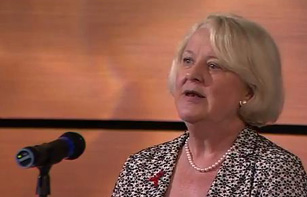
Ms Jan Beagle, UNAIDS Deputy Executive Director, Management and External Relations, spoke during the show and reiterated UNAIDS’s commitment to working with partners in support of the global target to halve TB deaths in people living with HIV by 2015.
Credit: UNAIDS
Tuberculosis (TB) remains one of the leading causes of death among people living with HIV globally, yet TB is mostly preventable and curable. Reducing TB deaths in people living with HIV by 50% by 2015 is one of the 2015 global AIDS targets.
To give voice to TB and HIV affected communities around the world by sharing their experience and views on the way forward in the fight against the two diseases, a live web casted talk show took place during the International AIDS Conference entitled “Tuberculosis + HIV: Protecting the Vulnerable”.
The talk show was hosted by Jeanne Meserve, former CNN and ABC reporter, and Gerry Elsdon, the International Federation of Red Cross and Red Crescent Societies (IFRC) TB Goodwill Ambassador and a South African TV personality who suffered from tuberculosis in the past. The show brought together a dynamic group of women and young people who have suffered from tuberculosis and HIV, as well as the representatives of multilateral organizations such as the Stop TB Partnership, WHO, IFRC, the Global Fund to fight HIV/AIDS, TB and Malaria, and UNAIDS.
The talk show also featured video addresses by Archbishop Tutu, who himself is a former TB patient and Jorge Sampai, UN Secretary-General Special Envoy for Tuberculosis.
Panelists took the opportunity to highlight the need for a closer collaboration between HIV and TB programmes, and about the urgent need for better investment in TB research. They also emphasized the need to invest more in integrating TB screening, treatment and care into antenatal care and maternal and child health services in general. Children most frequently get TB infection from a close relative, usually their mother, thus preventing, diagnosing and treating TB in women will reduce the risk of TB infection and disease in children.
Ms Jan Beagle, UNAIDS Deputy Executive Director, Management and External Relations, spoke during the show and reiterated UNAIDS’s commitment to working with partners in support of the global target to halve TB deaths in people living with HIV by 2015. She underscored that “UNAIDS advocates for TB service providers to reach many who are the most vulnerable and at risk, but who have the greatest problems in accessing services – migrants, indigenous people, prisoners, sex workers and women and children affected by poverty, violence, stigma and discrimination.“
The talk show was organized by the Stop TB Partnership and the International Federation of Red Cross and Red Crescent Societies.
Multimedia
Multimedia
External links
External links
Related

Feature Story
More effective AIDS coordination at country level discussed at AIDS 2012
22 July 2012
22 July 2012 22 July 2012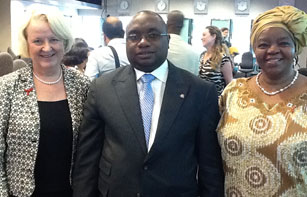
L to R: UNAIDS Deputy Executive Director, Management and Governance, Ms Jan Beagle, Minister of Public Health, Democratic Republic of Congo, HE Felix Kabange, and the UNAIDS Director, Regional Support Team for Eastern and Southern Africa, Sheila Tlou.
Evidence indicates that coordination and governance of the HIV response have posed significant challenges for many countries. To review lessons learned and establish key principles for more effective coordination of the AIDS response, a meeting took place during the International AIDS Conference entitled Fit for purpose: striving for more effective AIDS coordination at country level.
The meeting brought together representatives of National AIDS Commissions, civil society organizations, regional bodies and development partner organizations to reflect and re-direct energies to explore what a truly country owned and accountable public sector governance body for HIV should look like.
Participants at the meeting took the opportunity to debate about the future of coordination of the AIDS response and to agree on key principles for a framework of effective response coordination, through shared responsibility and global solidarity.
The principles presented focused on, amongst other things, the need for governments to take the lead of the AIDS response in the context of shared responsibility and global solidarity, inclusion of multiple stakeholders in the AIDS response, cross learning between other areas of health, development and HIV programming, and development of AIDS programmes based on country priorities and local experience of what works to achieve maximum accountability.
Ms Jan Beagle, UNAIDS Deputy Executive Director, closed the meeting by urging the participants to celebrate the successes they have achieved so far in tackling AIDS, while also looking to what more can be done in order to ‘get to zero’ new infections, AIDS related deaths and AIDS related stigma and discrimination, using actions and mechanisms that will be sustained and owned by national stakeholders. She emphasized that the positive lessons from the last decade of AIDS coordination need to be brought into the discussion, especially how coordination structures and processes have boosted greater transparency, inclusion of non-governmental stakeholder and emphasized equity and human rights.
The meeting was organized by UNAIDS, together with the World Bank, the United Nations Development Program, the World Health Organization, the German Agency for International Cooperation and the Global Fund to Fight AIDS, TB and Malaria.
Related
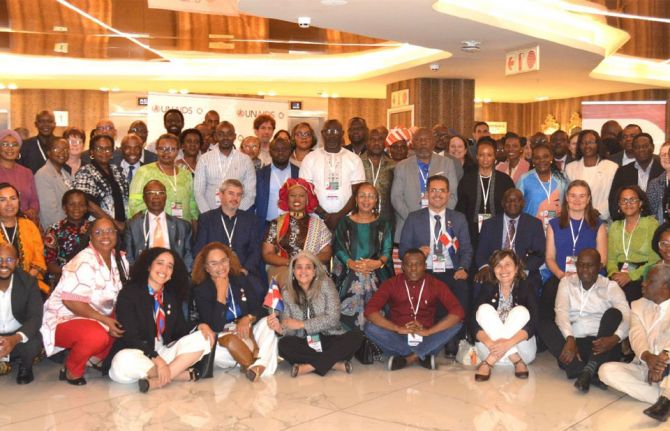 Building country-led sustainable HIV responses
Building country-led sustainable HIV responses

20 December 2024
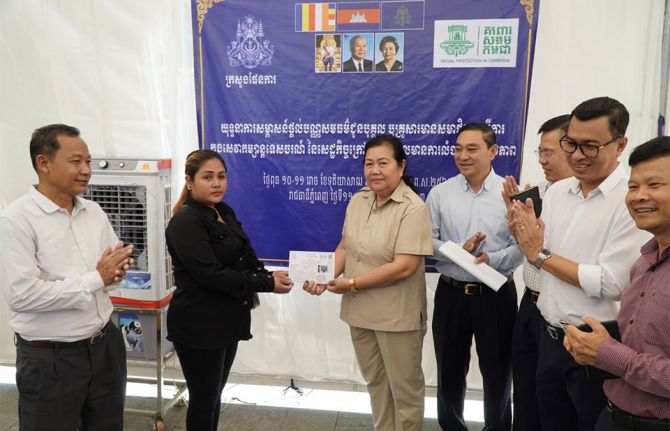 Cambodia social protection for people living with HIV
Cambodia social protection for people living with HIV

15 December 2023

Feature Story
Global Commission on Law urges countries to make the law work for HIV, not against it
11 July 2012
11 July 2012 11 July 2012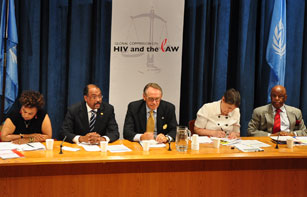
L to R: United States Congresswoman and member of the Global Commission on HIV and the Law, Barbare Lee; UNAIDS Executive Director Michel Sidibé; Deputy Secretary-General of the United Nations Jan Eliason; UNDP Administrator Helen Clark; and His Excellency Festus Mogae, former President of Botswana and member of the Global Commission on HIV and the Law.
Credit: D.Lowthian
The Global Commission on HIV and the Law launched its landmark report on 9 July 2012 at UN Headquarters in New York. The new report denounces the detrimental impact that punitive laws have on human rights and the HIV response and makes bold recommendations for addressing them.
“Never before has there been such an examination of the role of law in HIV,” said Festus Mogae, Former President of Botswana and member of the Commission. “What we have found is an epidemic of bad laws that is costing lives. We must end the epidemic of bad laws and enact laws based on evidence, common sense and human rights,” added Mr Mogae.
Stigma, discrimination and punitive legal approaches have long been recognized as barriers to the HIV response. They heighten vulnerability to HIV especially among key populations at higher risk of infection and make it difficult for individuals and communities to access HIV prevention, treatment, care and support services. UNAIDS has long called for the removal of punitive laws and their replacement with protective ones. Yet, countries across the world still maintain laws, policies and practices that infringe upon human rights, fuel discrimination and prevent global and national efforts to address HIV.
Speaking at the launch of the report, UNAIDS Executive Director Michel Sidibé noted that “the strength of this report is that it goes beyond a superficial description of stigma and discrimination to question the legal and structural fabrics that sustains inequality, injustice and human rights violations in the context of HIV”.
The report titled “HIV and the Law: Risks, Rights and Health” is a result of a two-year consultative process during which the Commission received more than 1 000 submissions from people affected by laws, law enforcement and access to justice issues in the context of HIV. The report took into account recommendations from 7 regional dialogues involving governments and civil society, and the input from a Technical Advisory Group of experts on HIV and the law.
Punitive laws increase risk of HIV infection
The Commission—an independent group of political and social leaders from around the world—pointed out that women in many parts of the world are governed by plural legal systems where traditional and customary law perpetuates their social and economic inequality. This situation makes women vulnerable to relationships and/or sexual violence which put them at risk of HIV infection. The Commission described the realities of many pregnant women living with HIV who face discrimination in health care including forced sterilization, even though simple and inexpensive medicine can prevent mother-to-child HIV transmission and keep mothers alive.
In the report, Commissioners called on governments to use the law to protect women from inequality and violence. They also urged governments to end legal barriers that prevent young people from accessing HIV information and services, as well as sexuality education—all necessary to avoid HIV infection.
The Commission also called for the removal of laws that criminalize people on the basis of their sexual orientation and gender identity, possession of drugs for personal use, and engagement in adult consensual sex work. It cited extensive evidence of how such criminal laws exacerbate risk of HIV infection among men who have sex with men, transgender people, people who use drugs and adults who sell and buy sex. According to the report, such laws drive people underground and into the margins of society away from health and HIV services. Furthermore, if convicted and sent to prison, the risks of contracting HIV, TB and Hepatitis C are very high because, in many countries, laws prohibit the provision of health and HIV prevention services and commodities in prisons.
We must end the epidemic of bad laws and enact laws based on evidence, common sense and human rights
Festus Mogae, Former President of Botswana and member of the Global Commission on HIV and the Law
Nick Rhoades from the Center of HIV Law and Policy spoke against the criminalization of HIV exposure and transmission, having himself been convicted in the United States of America, even though he had used condoms, had an undetectable viral load and did not transmit HIV. Citing the many HIV specific criminal laws, he said: “People have hands and can hit each other with their fists, but you don’t see a law specifically criminalizing a hand as a ‘deadly weapon’ like HIV is.” The Commission has called for the criminal law to be strictly limited to the malicious and intentional acts of actual transmission of HIV.
Participants at the launch highlighted how punitive legal approaches are undermining the investment in HIV prevention and treatment that is finally beginning to show the real possibility of halting and reversing the epidemic. They underlined that the persistence of punitive laws and practices is a serious concern at a time when the world has stabilized new HIV infections, increased its knowledge on effective HIV prevention and is preparing to harness the full potential of expanded HIV treatment. “It is outrageous that in 2012, when we have everything we need to beat this epidemic, we still must fight prejudice, discrimination, exclusion and bad laws,” said Mr Sidibé.
Law as an instrument to protect individuals
Commissioners at the launch underlined that there are many positive examples of countries that have used the law as an instrument to protect individuals, to create an environment that addresses stigma and violence thus encouraging access to HIV services. Other countries have used the law to challenge overly broad and stringent intellectual property regimes to reduce the cost of essential HIV medicines and to ensure their availability including through the production of generics.
“Law reform is complex, but countries can do much more,” said UNDP Administrator Helen Clark. “The task before us is to ensure better laws are adopted and enacted,” she added.
The Commission and its work have started dialogues across the world on issues that are difficult, controversial and complex. They are also issues that are central to human dignity, health and social justice. These dialogues are part of what Governments committed to do in the 2011 Political Declaration on AIDS where they pledged to review laws and policies that “adversely affect the successful, effective and equitable delivery of HIV services and consider their review”.
“We now have a powerful tool for advocacy and engagement to ask governments to uphold human rights for all people vulnerable to HIV,” said Ebony Johnson of the Athena Network. “This report should not be shelved.”
The Global Commission on HIV and the Law is an independent body, convened by the United Nations Development Programme (UNDP) on behalf of the Joint United Nations Programme on HIV/AIDS (UNAIDS). The Commission was supported by a Technical Advisory Group, which reviewed and analyzed existing public health and legal evidence and also commissioned original analysis. Additional information on the Commission, its processes and work is available at www.hivlawcommission.org.
External links
External links
Publications
Publications
Related

Feature Story
Thailand and neighbouring countries get together to help provide HIV treatment for thousands of migrants in need
02 May 2012
02 May 2012 02 May 2012
Many of Thailand’s more than five million migrants find themselves in situations that heighten their risk of HIV and have difficulty accessing key services such as antiretroviral therapy.
Credit: UNDP
Migration plays an integral role in Thailand’s economic development and the country hosts more than five million migrants from Cambodia, Lao People’s Democratic Republic (PDR) and Myanmar.
Many migrants however find themselves in situations that heighten their risk of HIV and have difficulty accessing key services such as antiretroviral therapy (ART). A recent regional conference, organised by the UN Development Programme (UNDP) and the Joint Initiative on Mobility and HIV/AIDS (JUNIMA) from 24-25 April explored ways of ensuring better provision of ART to this potentially vulnerable group.
Although migration is not in itself a risk factor for HIV, it can increase vulnerability, such as exploitative working conditions, which may include sexual violence; and separation from spouses/partners, families and established social and cultural norms and values.
A new study in the six provinces most affected by HIV in Thailand has shown that Cambodian migrants bear the highest burden with an HIV prevalence of 2.5%. The estimated adult prevalence in the country as a whole is 1.3%.
The Government of Thailand has taken steps to ensure that migrants have access to ART. Speaking at the conference, Dr Petchsri Sirinirund, Director of the National AIDS Management Centre at the Ministry of Health’s Department of Disease control said, “In the new national strategy for 2012-2016, we aim to provide access to quality HIV treatment and care for any person living with HIV in Thailand, regardless of their nationality.”
There is provision of antiretrovirals (ARVs) for certain categories of low skilled migrants but there are more people in need. Those who are officially registered can pay a fee for universal health coverage which includes HIV treatment and a limited number of people with temporary papers, some 2 300, receive ART through Thailand’s Global Fund project.
While we need to focus our discussion on availability of ARVs as a commodity, what also needs to be in place is a comprehensive system of medical and social care that is backed up by national and regional policy.
Promboon Panitchpakdi, Executive Director of Raks Thai Foundation, development NGO
Political commitment to providing high quality care, including antiretrovirals, is also evidenced by the establishment of a Memorandum of Understanding on Joint Action to Reduce HIV Vulnerability Associated with Population Movement. This was signed in December 2011 by the six members of the Greater Mekong Sub-region (Cambodia, Lao PDR, Myanmar, Thailand, Vietnam and the Yunnan Province of China). A Joint Plan of Action for the memorandum is being formulated.
In addition, Thai and Cambodian authorities have collaborated on a scheme which allowed Cambodian migrants to return to their home country to obtain a three month supply of ARVs.
However, many migrants are not in a position to access antiretrovirals. Each health scheme has a cost to individuals ranging from the equivalent of around 45 US dollars to 90 US dollars and there is also a long waiting list for treatment. A number of those who are unregistered never come to the attention of authorities and therefore receive no help.
The challenges of cross border navigation of different regulations, health systems, and languages, as well as the often temporary nature of migration, make it particularly challenging for migrants living with HIV to access ART along the migration continuum and to adhere to drug regimens.
Furthermore, being given ART does not only involve obtaining the drugs themselves but also ensuring access to wider HIV services like voluntary and confidential counseling and testing as an entry point to treatment.
According to Promboon Panitchpakdi, Executive Director of the Raks Thai Foundation, a development NGO, “While we need to focus our discussion on availability of ARVs as a commodity, what also needs to be in place is a comprehensive system of medical and social care that is backed up by national and regional policy.”
A number of recommendations emerged from the UNDP/JUNIMA conference. These included: examining ways to use TRIPS intellectual property and free trade agreement flexibilities to lower the cost of treatment services and increase coverage for migrants; harmonize treatment and referral protocols across countries; and ensure that in addition to treatment, migrants have better HIV services available.
Rathin Roy, Manager of UNDP Asia Pacific Regional Centre, is confident that migrants will be increasingly better served. “Thailand is a pioneer in implementing the human principle that migrants can access the same quality of HIV services and commodities that are available to citizens, and UNDP, through JUNIMA, is pleased to work in partnership with government and civil society across borders to address the challenges that will allow all migrants in need to access vital HIV treatment.”
External links
External links

Feature Story
UNAIDS and UNDP commend New Zealand’s leadership in the HIV response
13 March 2012
13 March 2012 13 March 2012
(L to R): UNDP Administrator Helen Clark, Prime Minister John Key and UNAIDS Executive Director Michel Sidibé.
UNAIDS Executive Director Michel Sidibé and UNDP Administrator Helen Clark praised New Zealand as a model for the AIDS response in a joint meeting on 6 March with the country’s Prime Minister, John Key.
New Zealand implemented early evidence-based programmes to ensure that vulnerable populations receive priority attention and support that was essential to control the spread of HIV. In 1987, New Zealand was among the first countries to introduce needle—syringe programmes for people who use drugs. It was also a regional pioneer in decriminalizing sex work (2003) and sex between men (1986). These programmes and reforms are widely credited with having prevented the spread of HIV among populations at high risk of infection in New Zealand. Nationally, HIV prevalence remains low, with about 0.1% of the population living with HIV.
During the meeting, Mr Sidibé urged Prime Minister Key to champion the UNAIDS vision of vision of Zero new HIV infections, Zero discrimination and Zero AIDS-related deaths in the Pacific region. "You have already made so much progress. Drawing on this experience, New Zealand can be the first country in the Pacific region to show that getting to Zero is possible,” said the UNAIDS Executive Director.
We can never relax—this is a deadly disease, and there is no cure. If you are complacent, HIV prevalence rates can take off
Helen Clark, UNDP Administrator
The UNDP Administrator warned of the need for continued vigilance in the HIV response, even in low prevalence countries like New Zealand. “We can never relax—this is a deadly disease, and there is no cure,” said Ms Clark. “If you are complacent, HIV prevalence rates can take off.”
Throughout the three-day mission to New Zealand, Mr Sidibé and Ms Clark encouraged senior government officials to lift travel restrictions for seasonal workers visiting New Zealand. “HIV-related travel restrictions have no public health rationale and are at odds with New Zealand’s outstanding record on HIV and human rights,” said Mr Sidibé.
Official opening of centre for women living with HIV
On the eve of International Women’s Day, and as part of their official visit to New Zealand, Mr Sidibé and Ms Clark opened Positive Women Inc’s new premises and community house in Auckland for women living with HIV. The organization aims to raise awareness of HIV in the community through educational programmes, with a particular focus on HIV prevention and de-stigmatisation.

Co-founders of Positive Women Inc. Judith Ackroyd (far left) and Suzy Morrison (far right) with UNDP Administrator Helen Clark, National Coordinator for Positive Women and Asia Pacific UNAIDS PCB NGO Delegate, Jane Bruning (centre) and UNAIDS Executive Director Michel Sidibé.
"It is an honour for me to join you in the opening of this impressive community house. Your efforts to support and empower women living with HIV are a true testament of your commitment to the AIDS response," said Mr Sidibé. "Women are critical agents of change and that by harnessing our collective strengths, we can end this epidemic."
The community house has been designed as a safe and welcoming space for women living with HIV and their families. It offers weekly member lunches, a relaxation lounge, a computer corner and printing facilities. Members are encouraged to organize knitting circles and conversation groups with their peers. An on-site social worker attends to the social and psychosocial needs of women and their families.
“Women represent the invisible face of the AIDS epidemic,” said Jane Bruning, National Coordinator of Positive Women Inc. “These are women who run households, cook dinner, have jobs and raise families. They are the ones keeping everything together. So to be able to offer them a place to come for advice or just a chat and a cup of tea is extremely important.”






